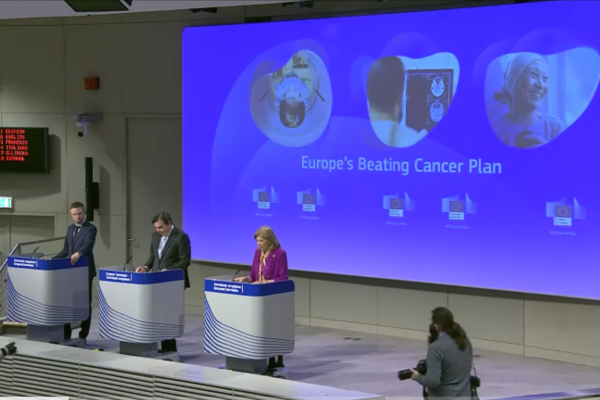|
In this issue:
|
|
|
|
|
Depression common after prostate diagnosis…
…But Black men are affected more, finds a new analysis
|
|
|
|
|
EU Cancer Plan: now let's make screening a reality
Europa Uomo will be working to follow up European Commission announcement
|
|
|
Prostate Research and Treatments
Family history a risk factor for AS
Active surveillance (AS) is the preferred management strategy for men with low-risk prostate cancer. The proportion of low-risk men taking AS as their initial treatment has been growing steadily both in Europe and latterly the United States. However, approximately one in three men on AS experience progression of disease leading to treatment within 5 years. Some of this progression to treatment may also be due to issues with the patient not related to any failure of the AS itself.
If it were possible to reliably distinguish between indolent and aggressive PCa this might improve patient selection criteria for AS.
This study also highlights that genomic testing is recommended for newly diagnosed patients with a strong history of prostate cancer or with BRCA1/2 related cancers. This study investigated the impact of family history on AS outcomes, under the hypothesis that men at high genetic risk for prostate cancer are at greater risk for progression to treatment on AS.
Read more by clicking on this link: Family History of Hereditary Cancer May Up PCa Progression Risk on Active Surveillance – Renal and Urology News
 |
|
|
Active Surveillance Webinar Report
A Town Hall Webinar – Testimonials by International Patients
Report by Cosimo Pieri, Europa Uomo Europe
The webinar’s objective was to present a number of testimonials by patients on Active Surveillance (AS). The contributors came from the US, Canada, Iceland and Italy. A number of Urologists recently presented webinars on AS, mainly by AnCan and Us TOO International. ASPI saw the need for AS patients to:
- share information and experiences,
- to understand better their PCa treatment path,
- how they could choose AS,
- the difficulties they encountered from their family doctors in their decision-making,
- also the difficulties they had accessing the sources of reliable information needed to take this decision,
- how they faced anxiety during they their AS journey,
- support they got during AS and;
- which type of support would best to offer in future to other men facing same experience,
- understanding of both overtreatment and undertreatment risks.
Continue reading Cosimo’s report by clicking here.
|
|
|
Webinar: "The Past Present and Future of Active Surveillance: A European View"
Active Surveillance Patients International (ASPI) is pleased to announce the next international webinar on February 27 at 11 AM EDT (5 PM CET): The Past Present and Future of Active Surveillance: A European View
Dr. Chris Bangma, Chairman of Urology at Erasmus University and Academic Hospital in Rotterdam, The Netherlands, will be the inaugural speaker for Active Surveillance Patients International at 11 a.m. Eastern U.S. on Saturday, February 27, 2021. Dr. Bangma’s topic will be “The Past Present and Future of Active Surveillance: A European View.”
Among other topics, he will cover the role of PSA testing in Europe, the role of biopsies and mpMRI scanning, genomics, how AS was developed in Europe, how AS works within the Dutch healthcare system, and what the future holds in terms of liquid biopsy and artificial intelligence.
Register here
|
|
|
Apalutamide v. placebo: Phase III results of the TITAN trial
Apalutamide is a recent drug developed for the treatment of men with metastatic castration sensitive prostate cancer (mCSPC) who are on androgen deprivation therapy (ADT). Just over 1,000 patients were randomised 1:1 for apalutamide or placebo in addition to standard ADT. During the Phase III trial both endpoints for Progression Free Survival (PFS) and Overall Survival (OS) were met to the extent that the trial was unblinded and 40% of the placebo patients who had not progressed crossed over to the Apalutamide arm. The short video presentation, by Prof. Kim Chi from Vancouver, Canada is available on the link below.
Interview: TITAN trial – UROONCO Prostate Cancer (uroweb.org)
|
|
|
Adverse pathology can indicate long-term outcomes
When a patient is diagnosed with a high-grade cancer at radical prostatectomy (RP), their situation is often used as a proxy for long-term prostate cancer outcomes.
Adverse pathology at radical prostatectomy is highly associated with future development of metastasis and prostate cancer mortality and may be used as a short-term predictor of these outcomes.
The study reported here defines high-grade as equal or greater than Grade Group 3 and/or non-organ confined disease. The study looked at 428 patients with follow-up over 20 years.
To read the abstract click on the link: Adverse pathology as a predictor of distant metastasis and prostate cancer mortality with 20-year follow up – UROONCO Prostate Cancer (uroweb.org)
|
|
|
Items of Interest
Genetic testing for prostate cancer - when and how?
Karen Knudsen from Philadelphia’s Sloan Ketting Cancer Center Presents the Case
The burden of care due to prostate cancer in the US is very high. There are significant disparities in cancer care but these are very marked in the case of prostate cancer amongst black men . Dr. Knudsen suggest that genetic testing is part of the solution for prostate cancer.
Watch and listen to a recent presentation at the ESOU: Genetic testing for prostate cancer: When and how? – UROONCO Prostate Cancer (uroweb.org)
|
|
|
|
|
|
FREE SUBSCRIPTION TO EUROPA UOMO MONTHLY UPDATE
All previous issues are available on website: www.europa-uomo.org/newsletters/
|
|









